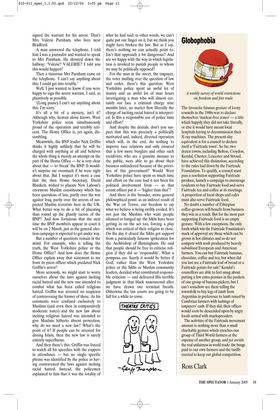Globophobia
A weekly survey of world restrictions on freedom and free trade The favourite fatuous gesture of loony councils in the 1980s was to declare themselves ‘nuclear-free zones’ — a title which happily they did not take literally, or else it would have meant local hospitals having to decommission their X-ray machines. The present-day equivalent is for a council to declare itself a ‘Fairtrade town’. So far, two dozen towns, including Bolton, Croydon, Kendal, Chester, Leicester and Stroud, have achieved this distinction, according to the rules laid down by the Fairtrade Foundation. To qualify, a council must pass a resolution supporting Fairtrade produce, launch a campaign to encourage residents to buy Fairtrade food and serve Fairtrade tea and coffee at its meetings. A proportion of local shops and cafés must also serve Fairtrade food.
No doubt a number of Ethiopian coffee-growers will benefit from business they win as a result. But for the most part supporting Fairtrade food is an empty gesture. With a few exceptions, the only foods which win the Fairtrade Foundation’s mark of approval are those which can be grown in hot climates and so do not compete with nosh produced by heavily subsidised European and American farmers. You can buy Fairtrade bananas, chocolate, coffee and tea; but when did you last see a Fairtrade loaf of bread or a Fairtrade potato for sale? Kendal’s councillors are able to feel smug about putting a few extra pennies in the pockets of one group of banana-pickers, but I can’t somehow see them telling the townsfolk to buy legs of lamb from Argentina in preference to lamb raised by Cumbrian farmers with lashings of taxpayers’ cash. If they did, their offices would soon be descended upon by angry locals armed with muckspreaders. The activities of the Fairtrade movement amount to nothing more than a small charitable gesture which enriches one group of Third World farmers at the expense of another group, and yet avoids the real unfairness in world trade: the bungs paid to our own farmers and the tariffs erected to keep out global competition.
Ross Clark







































 Previous page
Previous page